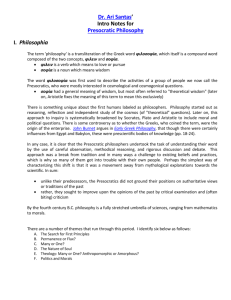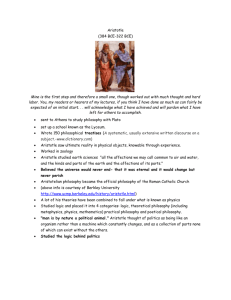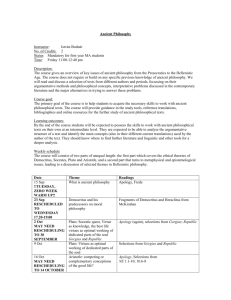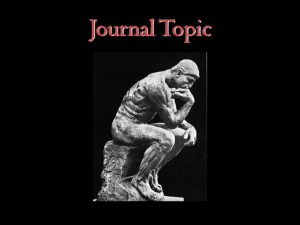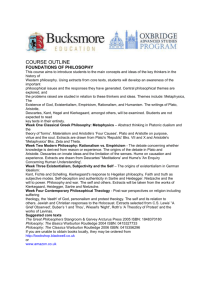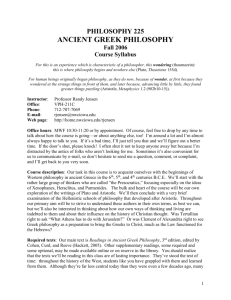I. Philosophy
advertisement
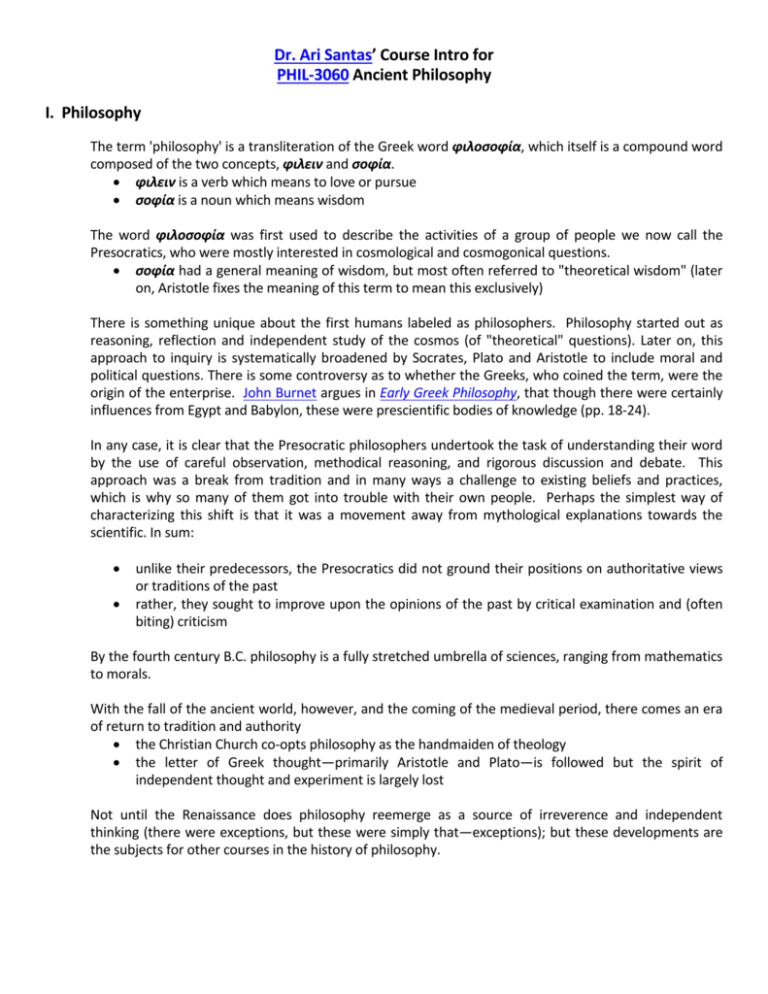
Dr. Ari Santas’ Course Intro for PHIL-3060 Ancient Philosophy I. Philosophy The term 'philosophy' is a transliteration of the Greek word φιλοσοφία, which itself is a compound word composed of the two concepts, φιλειν and σοφία. φιλειν is a verb which means to love or pursue σοφία is a noun which means wisdom The word φιλοσοφία was first used to describe the activities of a group of people we now call the Presocratics, who were mostly interested in cosmological and cosmogonical questions. σοφία had a general meaning of wisdom, but most often referred to "theoretical wisdom" (later on, Aristotle fixes the meaning of this term to mean this exclusively) There is something unique about the first humans labeled as philosophers. Philosophy started out as reasoning, reflection and independent study of the cosmos (of "theoretical" questions). Later on, this approach to inquiry is systematically broadened by Socrates, Plato and Aristotle to include moral and political questions. There is some controversy as to whether the Greeks, who coined the term, were the origin of the enterprise. John Burnet argues in Early Greek Philosophy, that though there were certainly influences from Egypt and Babylon, these were prescientific bodies of knowledge (pp. 18-24). In any case, it is clear that the Presocratic philosophers undertook the task of understanding their word by the use of careful observation, methodical reasoning, and rigorous discussion and debate. This approach was a break from tradition and in many ways a challenge to existing beliefs and practices, which is why so many of them got into trouble with their own people. Perhaps the simplest way of characterizing this shift is that it was a movement away from mythological explanations towards the scientific. In sum: unlike their predecessors, the Presocratics did not ground their positions on authoritative views or traditions of the past rather, they sought to improve upon the opinions of the past by critical examination and (often biting) criticism By the fourth century B.C. philosophy is a fully stretched umbrella of sciences, ranging from mathematics to morals. With the fall of the ancient world, however, and the coming of the medieval period, there comes an era of return to tradition and authority the Christian Church co-opts philosophy as the handmaiden of theology the letter of Greek thought—primarily Aristotle and Plato—is followed but the spirit of independent thought and experiment is largely lost Not until the Renaissance does philosophy reemerge as a source of irreverence and independent thinking (there were exceptions, but these were simply that—exceptions); but these developments are the subjects for other courses in the history of philosophy. II. Understanding the Ancient Period The Ancient Greek World The period of thought covered in this course spans roughly a thousand years. it is inappropriate, therefore, to try to study every idea and/or thinker in great detail in the span of a few weeks we must be selective, both in terms of who we include in our studies, and which works we shall attend to This period can of course be divided, as the title of the course indicates, and it can be done so in a variety of ways. Your editors, Baird/Kaufmann, break down the periods into four sections: i.Before Socrates ii.Socrates and Plato iii.Aristotle iv.Hellenistic philosophy One way we can begin to understand this period in terms of the themes that run through it. There are obviously numerous themes, any one of which a candidate for a course unto itself, but shall call your attention to the following: A. B. C. D. E. F. The Search for First Principles Permanence or Flux? Many or One? The Nature of Soul Theology: Many or One? Anthropomorphic or Amorphous? Politics and Morals A. The Search for First Principles What is the archē (ἀρχή)? ‘Archē’ is a term used by Aristotle used to describe basic or fundamental principle, but the term means many things in ancient Greek: beginning, origin, basic element or principle, (political) rule. It derives from the verb ἄρχω, which means ‘I begin.’ The Milesian Philosophers Thales: the archē is water (ὕδωρ) Anaximander: the archē is indefinite (άπειρων) Anaximenes: the archē is air (ἀήρ) Heraclitus: the archē is fire (πῦρ) Later on: Plato's Forms: a plurality of transcendent primary principles serve as first principles (archē = eidos, idea) Aristotle's essences: primary principles (archē) are in the things themselves (τὸ τί ἦν εἶναι = the what it is to be)) B. Permanence or Flux? Heraclitean Flux: nothing ever stays the same Parmenidean Permanence: nothing ever changes Sophistic Relativism: there is no truth, only human convention Platonic Dualism as synthesis: there is permanence and truth in a transcendent world; and flux and opinion in this earthly realm Aristotelian revision: yes, but permanence and truth are found on this earth C. Many or One? monism: there is fundamentally only one thing dualism: there are fundamentally two kinds of things pluralism: there are fundamentally many things D. The Nature of Soul (ψυχή) soul as breath (πνεύμα) is it the mover (animator) of things? is it separate from the body? is it immortal, persisting after the body dissipates? E. Theology polytheism/monotheism question (many or one?) nature of divinity (human-like or not?) god(s) as first mover(s) F. Politics and Morals Νόμος (culture) or Φύσις (nature)? Science, Religion and Morality: what is the connection? Living according to Nature (beginning of Natural Law Theory)
